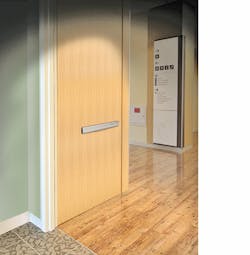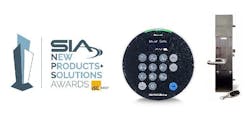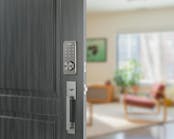Adams Rite Launches TRUE Wood Door With Inset Fire-Rated Hardware
Adams Rite, an ASSA ABLOY Group company, has launched the TRUE Wood door series, the first and only integrated full wood door system with inset hardware.
“Our TRUE Wood door offering is one of a kind on the market - and we’re confident it’s going to be a huge hit with architects that strive for high end wood design,” said Curt Hubacher, RITE Door Product Manager, EMS & OEM Group, ASSA ABLOY. “The current market offers wood veneer over a hollow metal door, which may result in splitting or cracking over time – but our TRUE Wood door features a conventional wood core construction, making this aesthetic setback a non-issue.”
The D3976 RITE Door with fire-rated concealed vertical rod exit device features a top latching mechanism that interlocks the door to the frame, and a clean design with just ¾” projection when inset in the door. The top rod design makes installation and preparation simple and reduces lifetime maintenance on the door.
“The inset device is also key for integrated applications with cross corridor functions like schools, airports, hotels and hospitals – where low-profile hardware assures easy, snag-free passage,” continued Hubacher. “It’s also available in 28 standard colors and custom color match, making design possibilities endless.”
The TRUE Wood door is available in several types; the GPD-EC 5-Ply engineered composite lumber core for Non Rated and 20 minute rating, and the GPD-FD 5-Ply fire core with fire ratings ranging from 45 to 90 minutes. All of the TRUE Wood doors are available in a wide variety of vertical and horizontal grain patterns and may contribute to the following four LEED 3.0 credits: MR4, MR5, MR7 and IEQ 4.4. A variety of product options are also available including silent electrification (SE) motorized latch retraction, request to exit (REX) monitoring/signal switches, and electric dogging.
For more information, visit www.ritedoor.com.
Steel Window Institute Launches Updated Website
The Steel Window Institute (SWI), an association of the leading manufacturers of steel windows and doors, invites visitors to its newly redesigned website: www.steelwindows.com. The site is a comprehensive guide for the selection and specification of many varieties of steel windows, including fixed, ventilated, hot rolled, cold formed, or fire rated. The guide also covers several types of entrance and interior doors and custom formed steel elements.
The all-new site design features a stunning gallery of installation photos, easier navigation, and updated technical and product information. As before, the SWI website showcases the many advantages of steel windows and doors and provides useful facts about steel windows’ strength and beauty as well as recycling, life cycle, energy, and solar heat gain.
The site provides comprehensive specifications and installation guidelines for various types of steel windows and doors. Many downloadable resources, including the Architect’s Guide to Steel Windows and various product sourcing guides, provide additional information. The new photo gallery features timeless window and door designs to complement a wide range of architectural styles from historic to contemporary. The versatility, durability, and long life cycle of steel windows and doors make them an excellent choice for almost any application.
The members of SWI are leading manufacturers of windows and doors made from either solid or formed sections of steel and related products such as casings, trim, mechanical operators, screens, and moldings that are manufactured and sold by members of the industry for use with steel windows and doors. SWI provides the public with general and technical information concerning the industry’s products. Proprietary specifications produced by each SWI member are available from individual members upon request.
For more information, contact the Steel Window Institute, 1300 Sumner Avenue, Cleveland, Ohio 44115-2851. Phone: 216-241-7333; fax: 216-241-0195. Web: www.steelwindows.com.
Electronic Locks Help TCU Bolster Campus Security
Texas Christian University (TCU) partnered with Allegion to help enhance security for its students by installing Schlage electronic locks in new residence halls and upgrading access control in existing buildings. A major factor in deciding on the lock selection was its ability to interface with TCU’s existing student ID cards, which students use for meal plans, vending machines and other purposes.
With its expansion continuing and new residence halls under construction, TCU wanted an access control system that would provide security for its students, yet be compatible with its existing CBORD card system. Flexibility to upgrade and meet future needs was an important consideration. Appearance also played a role in the selection.
"We wanted the lock and reader to be an all in one unit and it had to be aesthetically pleasing,” says Supervisor, Building Maintenance Ver Barritt.
To meet these needs, TCU selected Schlage AD-300 locks, hard-wired locks that are easy to install and provide online, real-time lock control. The integrated system makes it easy for administrators to add or remove users or to check the status of an opening. AD-Series locks combine all the components required at the door into one integrated design that incorporates the electrified lock, credential reader, request-to-exit switch, door position switch, tamper guard and more. Because the AD-Series is modular, it can be upgraded without taking the lock or the hardware off the door. This design allows institutions to minimize the cost of upgrading or adapting to technology as it changes. The AD-300 locks integrate seamlessly with the university’s CBORD CS access system to provide TCU with a cost-effective and scalable access control system.
The residence halls are configured with suites that incorporate several private rooms around a central area. The AD-300 locks are being installed on the entrance doors to each suite.
“If a student loses the key to his room, he is still secured in his suite by the card access and it saves us a lot of rekeying costs and emergency night calls,” says Barritt.
The changeable reader modules provide a unique advantage for TCU.
“If a student with disabilities has trouble sliding a card through the reader on his or her door, we can just change the module to one that also has push buttons,” explains Barritt.
More than 180 AD-Series electronic locks are deployed in two completed dormitories and also will be installed in a new residence hall now under construction. The AD-Series locks also will be used in future residence halls now being planned as well as for other applications throughout the campus. These include classrooms and offices in a new academic building and an addition to a nursing building.
“Eventually we would like to go to a keyless campus,” Barritt says.
Entrances to all buildings are secured by existing card readers and by Von Duprin 99 Series electrified exit devices. While access is controlled by the same cards as other applications, safe egress is provided by the exit devices. All exit devices feature the QEL (quiet electric latch). Since many of the entrances are located near residence suites, their quiet operation minimizes disturbance to sleeping or studying students.
Openings required to meet the ADA are equipped with LCN 4640 Auto Equalizer electrically powered low-energy operators. The college also uses Von Duprin keyed removable mullions, which make it easy to move large items in and out while providing greater physical security for double doors.






